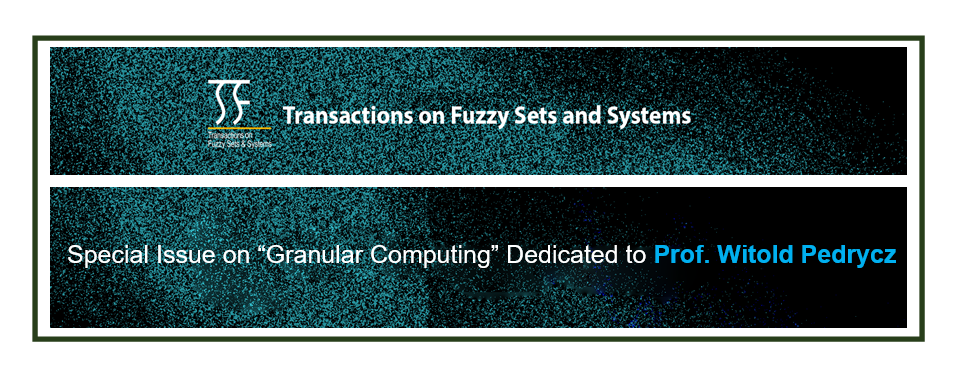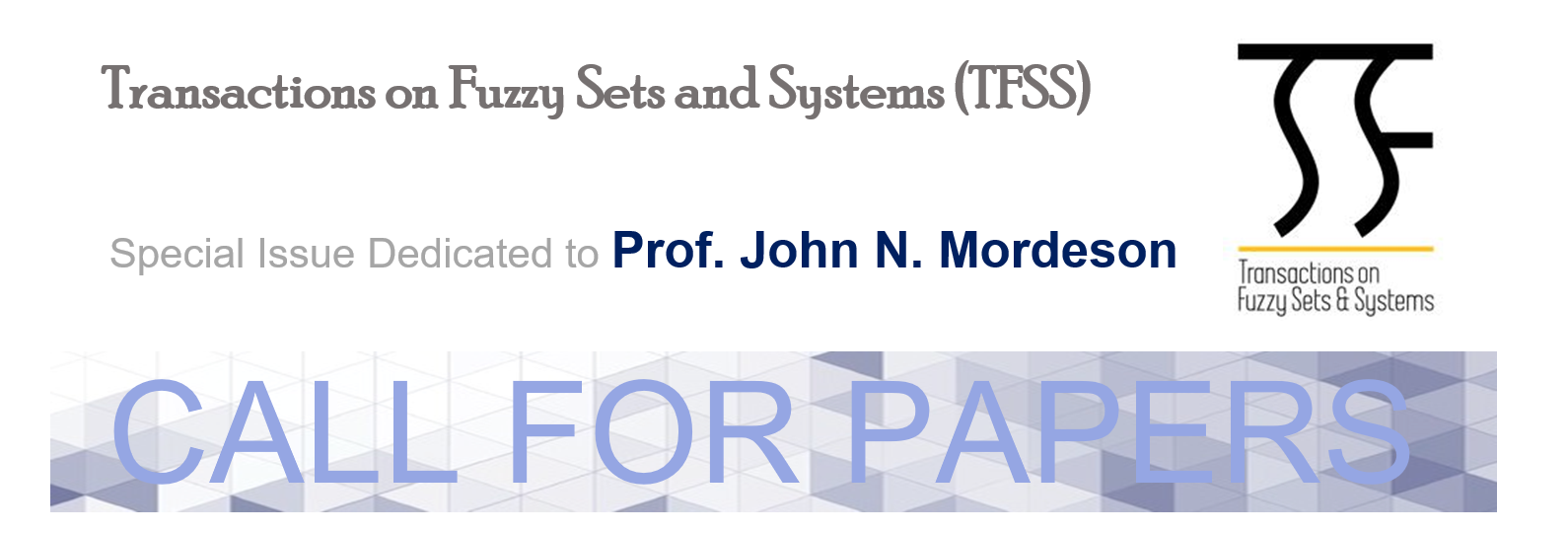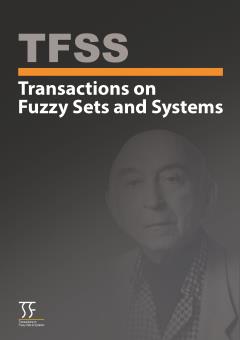
3-Special Issue on Dynamical Systems in Fuzzy Environments
The study of dynamical systems in fuzzy environments is vital due to the inherent uncertainties and complexities in real-world systems. Traditional mathematical models often fall short of accurately representing such systems, where ambiguity and imprecision are established. Fuzzy systems provide a framework for modelling and analysing these uncertainties, enabling more accurate predictions and better decision-making. This is particularly crucial in fields such as environmental modelling, social networks, graphs and optimization, where precise data is often unavailable or incomplete. By advancing research in this area, we can develop strong and adaptive systems capable of handling the complexities of modern challenges.
We are excited to announce a call for papers for a special issue of the journal Transactions on Fuzzy Sets and Systems on Dynamical Systems in Fuzzy Environments. This special issue aims to display innovative research and developments in the field of fuzzy systems and their applications in dynamic and complex environments.
This special issue will cover a broad range of topics related to dynamical systems in fuzzy environments. We invite researchers, and academicians to submit original research articles, comprehensive reviews, and case studies that contribute to the understanding and advancement of fuzzy systems. The scope of this special issue includes, but is not limited to, the following topics:
Uncertain Systems and Soft Computing:
- Modelling and analysis of uncertain systems using fuzzy logic.
- Applications of soft computing techniques in handling uncertainties.
- Integration of fuzzy systems with other computational intelligence methods.
Dynamic Systems and Numerical Analysis:
- Stability and control of dynamic systems in fuzzy environments.
- Numerical methods for solving fuzzy differential equations.
- Simulation and modelling of dynamic fuzzy systems.
Fuzzy Graphs and Social Networks:
- Analysis of fuzzy graphs and their applications in social networks.
- Fuzzy clustering and community detection in social networks.
- Influence and information propagation in fuzzy social networks.
Decision Making in Complex Environments:
- Fuzzy decision-making models and algorithms.
- Multi-criteria decision-making in fuzzy environments.
- Applications of fuzzy decision-making in real-world problems.
Optimization Techniques in Fuzzy Systems:
- Fuzzy optimization methods and algorithms.
- Applications of fuzzy optimization in engineering and management.
- Hybrid optimization techniques combining fuzzy logic with other methods.
Environmental and Ecological Modelling:
- Fuzzy modelling of environmental and ecological systems.
- Applications of fuzzy systems in sustainability and conservation.
- Risk assessment and management using fuzzy logic.
Guest Editors
Dr. Sovan Samanta,
Department of Mathematics., Tamralipta Mahavidyalaya, India;
Visiting Professor, Research Center of Performance and Productivity Analysis, Istinye University, Istanbul, Turkey;
Scientific Advisor, Department of Technical Sciences, Algebra University, Gradiscanska 24, 10000, Zagreb, Croatia.
Email: ssamantavu@gmail.com
Dr. Antonios Kalampakas
College of Engineering and Technology, American University of the Middle East, 54200, Egaila, Kuwait.
Email: antonios.kalampakas@aum.edu.kw
Dr. Leo Mrsic
Department of Technical Sciences, Algebra University, Gradiscanska 24, 10000, Zagreb, Croatia;
Rudolfovo Science and Technology Centre, Podbreznik 15, 8000 Novo mesto, Slovenia.
Email: leo.mrsic@algebra.hr
Authors are invited to submit high-quality, original research articles or well-structured review papers through the journal's online submission system at https://sanad.iau.ir/journal/tfss/.
Manuscript Submission Deadline: October 30, 2025 Notification of Acceptance: December 15, 2025
Final Manuscript Submission: February 15, 2026 Expected Publication Date: May 2026

2- Special Issue on “Granular Computing” Dedicated to Prof. Witold Pedrycz
Granular Computing (GC) is a computing paradigm that processes complex information units—information granules. Essentially, information granules are created by abstracting data and deriving knowledge from information. Information granules are ubiquitous. We often use time granules (seconds, months, years). We granulate images; millions of pixels processed individually by computers appear to us as granules representing physical objects. In natural language, we work based on granules of words that become crucial units to facilitate interaction and communication between people. Intuitively, we sense that information granules are at the heart of all our perceptual activities. Over time, several formal frameworks and tools have been proposed that focus on processing specific information granules. Interval analysis, rough sets, and fuzzy sets have all played important roles in the representation and processing of knowledge. Consequently, information granulation and information granules have appeared in numerous application domains. The well-known ideas of rule-based systems are based on information granules.
Topic in this special issue include, but are not limited to:
- Granular Computing and Decision-Making.
- Granular Computing and Optimization.
- Granular Computing and Intelligent Systems.
- Granular Computing and Machine Learning.
- Granular Computing and Approximate Reasoning.
- Granular Computing and Multi-Valued Logic.
- Granular Computing and Dynamic Systems.
Articles should only be sent to the editorial office electronically via https://sanad.iau.ir/Journal/tfss.
If you have any problems, please contact us: tfssiauba@gmail.com
(Submission Deadline: June 2025)
Editors:
Prof. Tofigh Allahviranloo, Research Center of Performance and Productivity Analysis, Istinye University, Istanbul, Türkiye.
Prof. Mehran Mazandarani, Dep. of Mechanical and Control Engineering, Shenzhen University, Shenzhen, China.
Dr. Sovan Samanta, Dep. of Mathematics Tamralipta Mahavidyalaya (Vidyasagar University) Visiting Professor, Istinye University, Istanbul, Türkiye.

1-Pioneering Fuzzy Set Theory: Celebrating the Contributions of Prof. John N. Mordeson
A Special Issue of TFSS is dedicated to Professor John N. Mordeson in celebration of his 91th birthday, to mark his long and outstanding research career in Fuzzy Knowledge and to honor his great contribution to the advancement of science.
John Mordeson is Professor Emeritus of Mathematics at Creighton University. Dr. Mordeson received his B. S., M. S., Ph. D. from Iowa State University. Dr. Mordeson has published twenty books and over two-hundred journal articles on fuzzy science and has remarkable achievements in Fuzzy Knowledge. He is on the editorial board of numerous journals and has valuable scientific activities in fuzzy science.
His research interests are in abstract algebra and fuzzy mathematics related to global challenges such as climate change, coronavirus pandemic, human tracking, biodiversity, and other grand challenges Also, He has provided with an extensive set of tools for applying fuzzy mathematics and graph theory to social problems such as human trafficking and illegal immigration.
Topics in this special issue include, but are not limited to:
- Fuzzy Set Theory, Fuzzy Structure;
- Fuzzy Graph, Fuzzy Model;
- Fuzzy Logic for Business, Finance, and Management;
- Fuzzy Mathematical Modeling;
- Soft Computing and Uncertainty Modeling;
- Fuzzy Mathematics with Applications to Engineering, Computer Science, and Mathematics.
and other interdisciplinary topics related to fuzzy mathematics.
Articles should only be sent to the editorial office electronically via https://sanad.iau.ir/Journal/tfss.
If you have any problems, please contact us: tfssiauba@gmail.com
Guest Editors:
Prof. Hee Sik Kim: Department of Mathematics, Hanyang University, Seoul, 04763, Korea.
Prof. Peide Liu: Professor, School of Management Science and Engineering, Shandong University of Finance and Economics, Shandong, China.
Prof. Sankar Kumar Roy: Professor, Department of Applied Mathematics, Vidyasagar University, Midanpore-721102, WB, India.
Prof. Sunil Mathew: Department of Mathematics, Associate Professor of National Institute of Technology, Calicut, India 673601.
Dr. Byung Soo Moon: Korea Atomic Energy Research Institute, Department of Instrumentation and Control, South Korea.
Dr. Kasani Prudhvi: Department of Mathematics, Osmania University, Hyderabad, India.
Submission Deadline: January 2025


